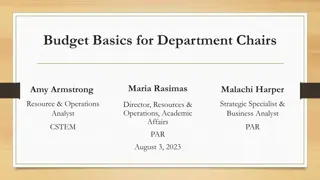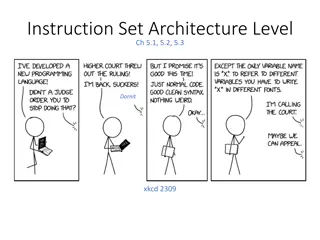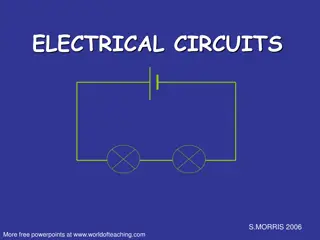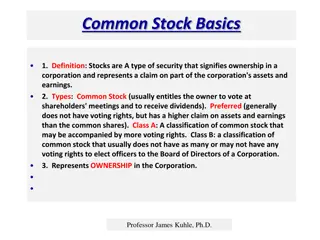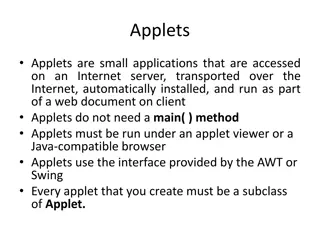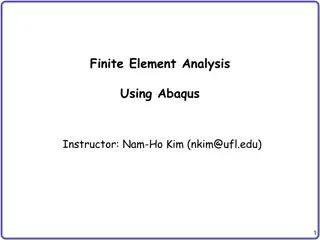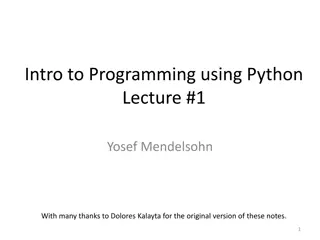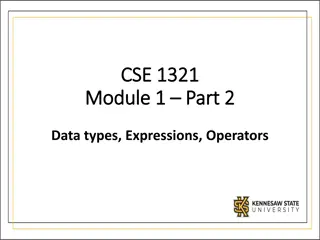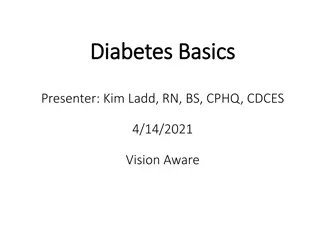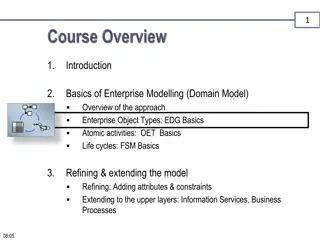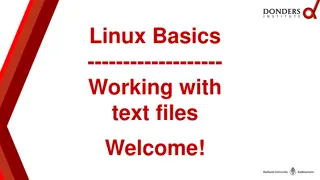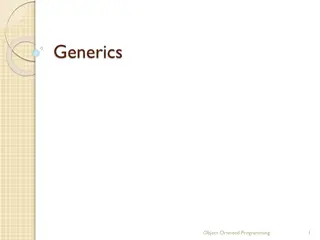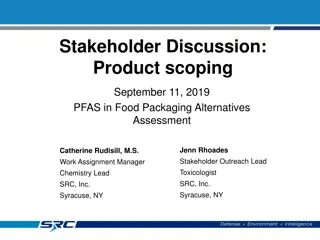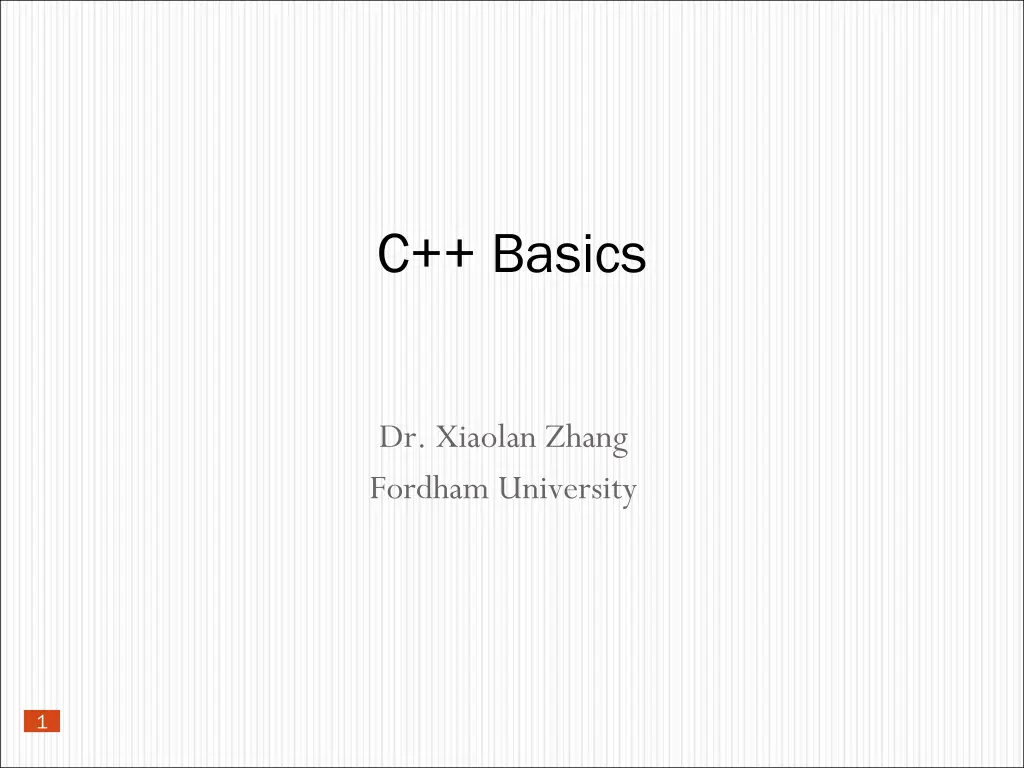
Important Concepts in C++ Programming
Learn about the basics of C++ programming, including printing to the terminal, keywords, special characters, and the cout statement. Understand the significance of keywords, usage of special characters, and how to use the cout statement for character output in C++. Explore code examples and concepts explained by Dr. Xiaolan Zhang from Fordham University.
Download Presentation

Please find below an Image/Link to download the presentation.
The content on the website is provided AS IS for your information and personal use only. It may not be sold, licensed, or shared on other websites without obtaining consent from the author. If you encounter any issues during the download, it is possible that the publisher has removed the file from their server.
You are allowed to download the files provided on this website for personal or commercial use, subject to the condition that they are used lawfully. All files are the property of their respective owners.
The content on the website is provided AS IS for your information and personal use only. It may not be sold, licensed, or shared on other websites without obtaining consent from the author.
E N D
Presentation Transcript
C++ Basics Dr. Xiaolan Zhang Fordham University 1
/* This is a program that simply prints out Hello world to the terminal, and move cursor to next line By X. Zhang, */ #include <iostream> //This is preprocessor directive int main() { std::cout <<"Hello world\n"; //display to terminal window // this is a blank line, added here for readability return 0; //program exits, return 0 to indicate success } Curly braces enclose the body of function 2
/* This is a program that simply prints out Hello world to the terminal, and move cursor to next line By X. Zhang, */ #include <iostream> //This is preprocessor directive using namespace std; // In order to use cin, cout etc declared in std int main() { cout <<"Hello world\n"; //display to terminal window // this is a blank line, added here for readability return 0; //program exits, return 0 to indicate success } Curly braces enclose the body of function 3
Keyword In previous example, the following words are keywords of C++ int, main, return, using Keywords (also called reserved words) Are used by the C++ language Must be used as they are defined in the programming language Cannot be used for other purposes 4
Special characters in C++ # is used to start a directive ; is used to end an statement // is used to start a single line of comments /* and */ are used to enclose multi-line comments Double quotation marks " used to enclose a string constant Note that this is not the same as Single quotation marks used to enclose a character constant Important to use plain text editor to edit your program: not word, WordEdit, as they introduce other characters, and convert quotations marks 5
cout statement cout <<"Hello world\n"; cout: pronounced as see-out, stands for character output Defined in iostream, a header file (a source code) that is part of C++ standard library Represents the terminal window that the program is running from << insertion operator: to insert (display) something in terminal window Can display multiple values in single statement, e.g., cout <<"Hello world, " << "this is my first program!\n"; cout <<"Hello world, " << this is my first program!\n"; One statement can be split into multiple lines. 6
Computation Code (input) data (output) data data Input: from keyboard, files, other input devices, other programs, other parts of a program Computation what our program will do with the input to produce the output. Output: to screen, files, other output devices, other programs, other parts of a program 8
Program structure Single batch of input Single batch of input 1 Read inputs Multiple batch of input Multiple batch of input 1 Read inputs 2 Computation 2 Computation 3 Write output 3 Write output 4 Go back to 1 9
Input and Output Input and oOytpt // read first name: #include <iostream> #include <string> using namespace std; int main() { cout << "Please enter your first name (followed " << "by 'enter'):\n"; string first_name; cin >> first_name; cout << "Hello, " << first_name << '\n'; } // note how several values can be output by a single statement // a statement that introduces a variable is called a declaration // a variable holds a value of a specified type // the final return 0; is optional in main() // but you may need to include it to pacify your compiler 10
Input and Type We read data/or input into a variable Here, first_name A variable has a type Here, string The type of a variable determines what operations we can do on it Here, cin>>first_name; reads characters until a whitespace character is seen White space: space, tab, newline, 11
Overview Variables and Assignments Data Types and Expressions Input and Output Program Style 12
C++ Variables Variables are like small blackboards We can write a number on them We can change the number We can erase the number C++ variables are memory locations We can write a value in them We can change the value stored there We cannot erase the memory location Some value is always there 13
C++ Variables A variable is some memory that can hold a value of a given type A variable has a name Each variable has name, type, value A declaration names a variable int a = 7; char c = 'x'; string s = "qwerty"; 7 a: c: 'x' 6 s: "qwerty" Size of memory varies for objects of different types ! 14
Display 2.1 (2 /2) 16
Identifiers Variables names are called identifiers Choosing variable names Use meaningful names that represent data to be stored First character must be a letter or the underscore character, _ Remaining characters must be Letters, numbers, underscore character Keywords, such as return, main, if, cannot be used as identifiers 17
Declaring Variables Before use, variables must be declared Declaration syntax: type_name variable_1 , variable_2, . . . ; Tells the compiler: I need variable(s) named to store .. type of data int number_of_bars; double one_weight, total_weight; Try this: what does the above three declarations say? How about this? char response, option; 18
Two locations for variable declarations Immediately prior to use At the beginning int main() { int sum; sum = score1 + score 2; return 0; } int main() { int sum; sum = score1 + score2; return 0; } 19
Assignment Statements An assignment statement changes the value of a variable total_weight = one_weight + number_of_bars; total_weight is set to the sum one_weight + number_of_bars Assignment statements end with a semi-colon Left hand side (LHS): variable whose value is to be changed Right hand side (RHS): new value for the LHS variable: Constants -- age = 21; Variables -- my_cost = your_cost; Expressions -- circumference = diameter * 3.14159; 20
Assignment Statements The = operator in C++ is not an equal sign The following statement cannot be true in algebra number_of_bars = number_of_bars + 3; In C++ it means the new value of number_of_bars is the previous value of number_of_bars plus 3 21
Initializing Variables Declaring a variable does not give it a value Giving a variable its first value is initializing the variable Variables are initialized in assignment statements double mpg; // declare the variable mpg = 26.3; // initialize the variable Declaration and initialization can be combined Method 1 double mpg = 26.3, area = 0.0 , volume; Method 2 double mpg(26.3), area(0.0), volume; 22
Exercises Can you Declare and initialize two integers variables to zero? The variables are named feet and inches. Declare and initialize two variables, one int and one double? Both should be initialized to the appropriate form of 5. Give good variable names for identifiers to store the speed of an automobile? an hourly pay rate? the highest score on an exam? 23
Overview Variables and Assignments Data Types and Expressions Input and Output Program Style 24
Types C++ provides a set of types E.g. bool, char, int, double Called built-in types C++ programmers can define new types Called user-defined types We'll get to that eventually, mostly in CS2 C++ standard library provides a set of types E.g. string, vector, complex Technically, these are user-defined types they are built using only facilities available to every user 25
Builtin Types (1) Boolean type represents value of true or false bool ex: bool invalidInput; // used to mark invalid input Character type represents a single character, such as q, a, B, \n, (, char Ex: char choice = q ; 26
Builtin Types (2):Integer Number types Integer numbers (int, short,long) are whole numbers without a fractional part Includes zero and negative numbers Used for storing values that are conceptually whole numbers (e.g. pennies) Process faster and require less storage space (compared to floating-point numbers) 27
Types and literals int pennies = 8; cout << " Hello world\n "; Literal constants: values that occurs in the program Literal, as we can only speak of it in terms of its value Constant: its value cannot be changed How to write literals? Depending on the type of the literal 8 is of type int, Hello world\n is of type string More examples: bool validInput = true; bool continue = false; // reserved words Character literals: 'a', 'x', '4', '\n', '$'. Integer literals: 0, 1, 123, -6, 0x34, 0xa3, 024 Floating point literals: 1.2, 13.345, .3, -0.54, 1.2e3, . 3F, .3F String literals: "asdf", "Howdy, all y'all! 28
Builtin Types(3): Floating point types Floating-point types represents number with decimal points, such as 3.14 double, and float Process slower and require more storage space 29
Type char char: can be any single character from the keyboard To declare a variable of type char: char letter; Character constants are enclosed in single quotes char letter = 'a'; Strings constant, even if contain only one character, is enclosed in double quotes cout << "Hello world "; "a" is a string of characters containing one character 'a' is a value of type character 30
More on floating point constants floating point constants Simple form must include a decimal point e.g., 34.1 23.0034 1.0 89.9 Scientific Notation form e.g. 3.41e1 means 34.1 3.67e17 means 367000000000000000.0 5.89e-6 means 0.00000589 Number left of e does not require a decimal point Exponent cannot contain a decimal point 32
C++ Standard Library Type: string string is a class, different from primitive data types discussed so far Requires the following be added to the top of your program: #include <string> Use double quotes around the text to store into the string variable To declare a variable of type string: string name = "Apu Nahasapeemapetilon"; 33
Overview Variables and Assignments Data Types Expressions Input and Output Program Style 35
Operation on data Once we have variables and constants, we can begin to operate with them. C++ defines operators. Operators in C++ are mostly made of signs that are not part of alphabet but are available in all keyboards. Shorter C++ code and more international 36
Operators Assignment (=) The assignment operator assigns a value to a variable. Arithmetic operators ( +, -, *, /, % ) five arithmetical operations supported by the C++ language are Addition: + subtraction: - Multiplication: * Division: / Modulo: %, gives remainder of a division of two values. a = 11 % 3; // a will contain the value of 2 37
Assignment and increment a: // changing the value of a variable int a = 7; // a variable of type int called a // initialized to the integer value 7 a = 9; // assignment: now change a's value to 9 7 9 a = a+a; // assignment: now double a's value 18 a += 2; // increment a's value by 2 // a shorthand notation for a = a+2; ++a; // increment a's value (by 1) //shorthand notation for a = a+1; 20 21 38
Simple arithmetic // do a bit of very simple arithmetic: #include <math.h> int main() { cout << "please enter a floating-point number: "; // prompt for a number double n; cin >> n; cout << "n == " << n << "\nn+1 == " << n+1 << "\nthree times n == " << 3*n << "\ntwice n == " << n+n << "\nn squared == " << n*n << "\nhalf of n == " << n/2 << "\nsquare root of n == " << sqrt(n) << endl; } // floating-point variable // '\n' means a newline // library function // another name for newline If the user enters 25 upon the prompt, what s the output? 39
Arithmetic Expressions Arithmetic operators can be used with any numeric type, i.e., operand can be any numeric type Result of an operator depends on types of operands If both operands are int, result is int If one or both operands are double, result is double 40
Division of Doubles Division with at least one double operand produces expected results double divisor, dividend, quotient; divisor = 3.0; dividend = 5.0; quotient = dividend / divisor; result: quotient = 1.6666 Result is same if either dividend or divisor is of type int 41
Division of Integers Division of Integers int / int produces an integer result int dividend, divisor, quotient; dividend = 5; divisor = 3; quotient = dividend / divisor; The value of quotient is 1, not 1.666 Integer division does not round result, fractional part is discarded! 42
Integer Remainders % operator gives remainder from integer division int dividend, divisor, remainder; dividend = 5; divisor = 3; remainder = dividend % divisor; The value of remainder is 2 43
Discussion Giving changes for Cashier program Instruct the cashier to give changes, e.g., a change of $12.34 should be given in One 10 dollar bill two 1 dollar bills One quarter One nickel Four pennies 44
Arithmetic Expressions Use spacing to make expressions readable Which is easier to read? x+y*z or x + y * z Precedence rules for operators are the same as used in your algebra classes Use parentheses to alter the order of operations x + y * z ( y is multiplied by z first) (x + y) * z ( x and y are added first) 45
Operator Shorthand Operator shorthand: can be used when applying an arithmetic operation on a variable and saving result back to the varilable, += e.g., count = count + 2; becomes count += 2; *= e.g., bonus = bonus * 2; becomes bonus *= 2; /= e.g., time = time/rush_factor; becomes time /= rush_factor; %= e.g., remainder = remainder % (cnt1+ cnt2); becomes remainder %= (cnt1 + cnt2); 47
Increment/Decrement Unary operators require only one operand + in front of a number such as +5 - in front of a number such as -5 ++ increment operator Adds 1 to value of a variable x ++; is equivalent to x = x + 1; -- decrement operator Subtracts 1 from value of a variable x --; is equivalent to x = x 1; 48
Overview Variables and Assignments Data Types Expressions Input and Output Program Style 49
Input and Output A data stream is a sequence of data: in the form of characters or numbers An input stream is data for the program to use, originating from keyboard, a file An output stream is the program s output, destining to monitor, or a file , .. Include directives: add library files to our programs To make definitions of the cin and cout available : #include <iostream> Using directives: include a collection of defined names To make names cin and cout available to our program: using namespace std; 50
Output using cout cout is an output stream for program to send data to monitor insertion operator "<<" inserts data into cout cout << number_of_bars << " candy bars\n"; sends two items to monitor: value of number_of_bars, and quoted string constant No space added between items, therefore space before the c in candy, A blank space can also be inserted with cout << name << " " <<age <<endl ; A new insertion operator is used for each item of output same as cout << number_of_bars ; cout << " candy bars\n"; cout an expression directly cout << "Total cost is $" << (price + tax); 51


